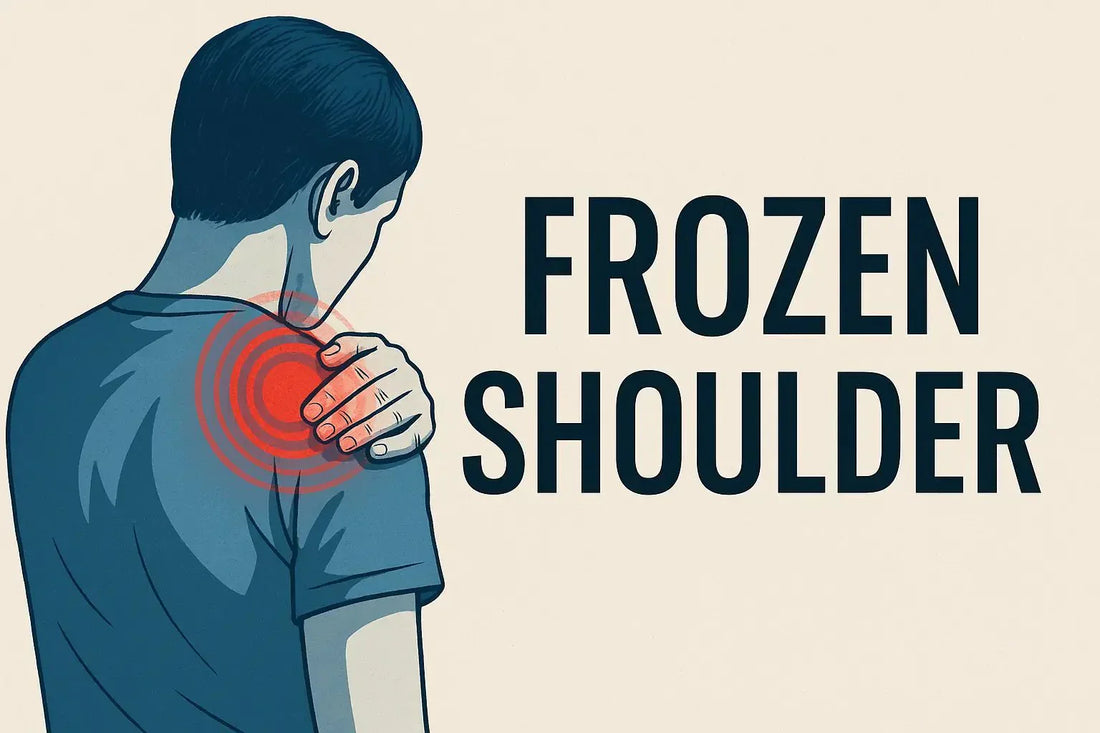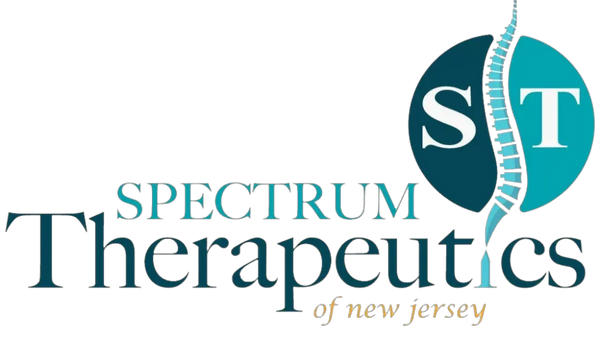
Frozen Shoulder in 2025: Why It Drags On—and How to Thaw It Faster
Dr. Rob Letizia PT, DPTShare
By Dr. Rob Letizia, PT, DPT | Spectrum Therapeutics of NJ – Wayne, NJ
Adhesive capsulitis, commonly known as frozen shoulder, affects approximately 2-5% of the general population and represents one of the most challenging shoulder conditions to treat effectively. This condition involves progressive loss of shoulder motion due to inflammation and subsequent contracture of the glenohumeral joint capsule, resulting in significant pain and functional disability. While the natural history of frozen shoulder typically involves eventual resolution over 1-3 years, this prolonged timeline is unacceptable for most patients who require timely restoration of function for work, daily activities, and quality of life. At Spectrum Therapeutics in Wayne, NJ, we have developed evidence-based frozen shoulder recovery Wayne NJ programs that significantly accelerate the healing process and restore function in a fraction of the typical recovery time for patients throughout Passaic County.
Understanding the Pathophysiology of Adhesive Capsulitis
Frozen shoulder involves a complex inflammatory and fibrotic process that affects the glenohumeral joint capsule, synovium, and surrounding soft tissues. The condition typically progresses through three distinct phases, each characterized by different pathological processes and clinical presentations that require specific treatment approaches.
The inflammatory phase, often called the "freezing" stage, involves acute synovitis and capsular inflammation that results in significant pain and progressive loss of motion. During this phase, which typically lasts 2-9 months, patients experience severe pain that is often worse at night and progressive stiffness that limits functional activities.
The fibrotic phase, known as the "frozen" stage, is characterized by reduced inflammation but increased capsular contracture and adhesion formation. Pain typically decreases during this phase, but stiffness reaches its maximum, with patients often losing 50% or more of their shoulder motion in all directions.
The resolution phase, called the "thawing" stage, involves gradual restoration of motion as the inflammatory process resolves and capsular restrictions slowly improve. Without intervention, this phase can last 12-42 months before full function is restored.
Our comprehensive shoulder rehabilitation Wayne NJ program is specifically designed to address the unique challenges presented by each phase of adhesive capsulitis.
Risk Factors and Associated Conditions
Understanding the risk factors for frozen shoulder helps with both prevention and treatment planning. Certain medical conditions and demographic factors significantly increase the likelihood of developing adhesive capsulitis.
Diabetes mellitus is the most significant risk factor, with frozen shoulder occurring in 10-36% of diabetic patients compared to 2-5% of the general population. The relationship between diabetes and frozen shoulder appears to be related to advanced glycation end products that affect collagen structure and healing.
Other endocrine disorders including thyroid dysfunction, Dupuytren's contracture, and autoimmune conditions also increase risk. Women are affected more frequently than men, with peak incidence occurring between ages 40-60.
Prolonged immobilization following injury, surgery, or illness can trigger frozen shoulder development. This is why early mobilization following shoulder injuries or surgeries is crucial for prevention.
Trauma to the shoulder region, including minor injuries that might not seem significant at the time, can initiate the inflammatory cascade that leads to adhesive capsulitis development.
Evidence-Based Assessment and Diagnosis
Accurate diagnosis of frozen shoulder requires careful clinical assessment to differentiate it from other conditions that can cause similar symptoms and functional limitations.
Clinical examination reveals the characteristic pattern of motion loss, with external rotation being most severely affected, followed by abduction and internal rotation. The "capsular pattern" of restriction helps distinguish frozen shoulder from other shoulder pathologies.
Passive range of motion testing demonstrates significant restrictions that are not overcome with examiner force, indicating true capsular contracture rather than voluntary guarding or muscle weakness.
Imaging studies including X-rays help rule out arthritis, fractures, or other bony pathology. While MRI is not always necessary, it can help identify associated rotator cuff tears or other soft tissue pathology that might influence treatment planning.
Diagnostic criteria include progressive onset of shoulder stiffness, significant restriction in both active and passive range of motion, and normal or near-normal X-ray findings. The presence of night pain and difficulty sleeping on the affected side further supports the diagnosis.
Phase-Specific Treatment Approaches
Inflammatory Phase Management
During the inflammatory phase, treatment focuses on pain control and maintaining available range of motion while avoiding activities that exacerbate inflammation and pain.
Pain management strategies include appropriate use of anti-inflammatory medications, modalities such as heat and cold therapy, and gentle manual therapy techniques that do not provoke symptoms.
Range of motion exercises during this phase must be carefully dosed to maintain available motion without causing symptom flare-ups. Gentle pendulum exercises, passive range of motion within pain limits, and basic stretching help prevent complete motion loss.
Patient education about the condition, expected timeline, and appropriate activity modifications helps manage expectations and reduce anxiety about the diagnosis.
Sleep positioning and pain management strategies are crucial during this phase when night pain often significantly impacts quality of life and recovery.
Fibrotic Phase Intervention
The fibrotic phase requires more aggressive intervention to address capsular contractures and restore motion. This is when intensive rehabilitation can dramatically impact outcomes and reduce total recovery time.
Intensive stretching programs targeting the contracted capsule become the primary intervention during this phase. These exercises must be performed with sufficient intensity and duration to promote tissue remodeling.
Manual therapy techniques including joint mobilization, capsular stretching, and soft tissue mobilization help address specific restrictions and improve the effectiveness of exercise interventions.
For patients with persistent restrictions that do not respond to conservative treatment, advanced interventions such as manipulation under anesthesia or arthroscopic capsular release may be considered.
Home exercise programs become crucial during this phase, with patients typically required to perform stretching exercises multiple times daily to maintain and build upon gains made during treatment sessions.
Resolution Phase Optimization
During the resolution phase, treatment focuses on optimizing the return of motion and strength while addressing any residual functional limitations.
Progressive strengthening exercises target the rotator cuff and periscapular muscles that may have become weak during the period of limited motion and activity.
Functional training helps patients relearn normal movement patterns and return to work and recreational activities safely and efficiently.
Ongoing maintenance programs help prevent recurrence and ensure that gains are maintained long-term.
Advanced Treatment Modalities
For patients with refractory frozen shoulder that does not respond adequately to standard conservative treatment, several advanced interventions can provide significant additional benefits.
Hydrodilatation, also known as capsular distension, involves injection of saline solution into the joint capsule to mechanically stretch contracted tissues. This procedure, when combined with immediate aggressive stretching, can dramatically improve range of motion.
Corticosteroid injections can help manage inflammation during the acute phase and may be combined with hydrodilatation for enhanced effectiveness. The timing and technique of injection are crucial for optimal outcomes.
For chronic cases with persistent limitations, we may incorporate shockwave therapy in Wayne NJ to promote tissue remodeling and improve the effectiveness of stretching interventions.
Manipulation under anesthesia involves controlled stretching of the shoulder while the patient is under general anesthesia. This technique can provide rapid improvement in motion but requires aggressive post-procedure rehabilitation to maintain gains.
Arthroscopic capsular release involves surgical division of contracted capsular tissues and can be highly effective for refractory cases. However, success depends heavily on intensive post-operative rehabilitation.
Exercise Prescription and Progression
Effective exercise prescription for frozen shoulder requires careful attention to timing, intensity, and progression based on the patient's current phase and response to treatment.
Stretching exercises must target the specific capsular restrictions present in frozen shoulder, with particular emphasis on external rotation, which is typically most severely affected. These exercises often need to be performed for extended periods (30-60 seconds) to effectively influence capsular tissue.
Progressive loading helps patients gradually return to functional activities while ensuring that improvements in motion are maintained. The exercise program must balance the need for tissue mobilization with protection of healing structures.
Home exercise compliance is crucial for success, requiring patient education about proper technique, frequency, and progression. Most patients need to perform exercises 2-3 times daily for optimal results.
Functional integration ensures that improvements in range of motion translate to improved ability to perform daily activities and work tasks.
Pain Management Strategies
Effective pain management is crucial throughout all phases of frozen shoulder treatment, as pain can significantly limit participation in rehabilitation and delay recovery.
Medication management may include NSAIDs for inflammation control, pain medications for severe symptoms, and sometimes neuropathic pain medications for persistent nerve-related symptoms.
Physical modalities including heat therapy, cold therapy, and electrical stimulation can provide symptomatic relief and support more intensive rehabilitation interventions.
Manual therapy techniques can provide both immediate pain relief and improved function, helping patients tolerate more intensive exercise interventions.
Activity modification and pacing help patients maintain function while managing symptoms during the recovery process.
Expected Outcomes and Timeline
With appropriate intensive treatment, most patients with frozen shoulder can expect significant improvement in a much shorter timeframe than the natural history of the condition suggests.
Early intervention during the inflammatory phase can prevent progression to severe motion loss and reduce overall recovery time. Patients who begin treatment early often recover in 6-9 months rather than the typical 18-24 months.
Intensive treatment during the fibrotic phase can restore 80-90% of normal motion within 3-6 months when combined with appropriate advanced interventions when needed.
Factors that positively influence outcomes include early diagnosis and treatment, good compliance with exercise programs, appropriate use of advanced interventions when indicated, and management of associated conditions such as diabetes.
Long-term outcomes are generally excellent, with most patients returning to normal or near-normal shoulder function. Recurrence is uncommon when proper treatment is provided.
Patient Education and Self-Management
Education plays a crucial role in frozen shoulder management, helping patients understand their condition and participate actively in their recovery.
Understanding the phases of frozen shoulder helps patients maintain realistic expectations and motivation during the lengthy recovery process.
Proper exercise technique education ensures that home programs are performed safely and effectively. Many patients benefit from video instruction and regular technique review.
Pain management education helps patients distinguish between therapeutic discomfort during stretching and harmful pain that should be avoided.
Activity modification guidance helps patients maintain function while protecting healing tissues and avoiding symptom exacerbation.
Why Choose Spectrum Therapeutics for Frozen Shoulder Treatment
Our Wayne, NJ clinic offers distinct advantages for patients seeking expert frozen shoulder treatment. Dr. Rob Letizia brings over 25 years of experience in shoulder rehabilitation, with specialized training in advanced manual therapy techniques and evidence-based treatment protocols for adhesive capsulitis.
Phase-specific treatment protocols ensure that interventions are appropriately matched to the patient's current stage of the condition, optimizing outcomes while minimizing unnecessary discomfort.
Advanced treatment options including specialized manual therapy, injection procedures, and modern technology provide additional tools for addressing refractory cases.
Comprehensive approach addresses not only the shoulder restriction but also associated factors such as postural dysfunction, cervical spine involvement, and functional limitations.
Our comprehensive physical therapy Wayne NJ program integrates frozen shoulder treatment with overall shoulder health and function optimization.
Convenient location and flexible scheduling accommodate the intensive treatment schedules often required for optimal frozen shoulder recovery.
Getting Started with Your Recovery
If you're experiencing progressive shoulder stiffness and pain that may indicate frozen shoulder, early intervention can significantly impact your recovery timeline and outcomes. The sooner appropriate treatment begins, the better your chances of avoiding prolonged disability.
Our comprehensive evaluation will determine your current phase of frozen shoulder and develop an intensive treatment plan designed to accelerate your recovery and restore function as quickly as possible.
Ready to begin your frozen shoulder recovery? Schedule your evaluation today or call us at (973) 689-7123. Let our proven treatment methods help you restore shoulder function and get back to the activities you enjoy.
For more information about our comprehensive approach to frozen shoulder treatment, visit our new patient information page to learn how we can help you overcome adhesive capsulitis and restore full shoulder function.



